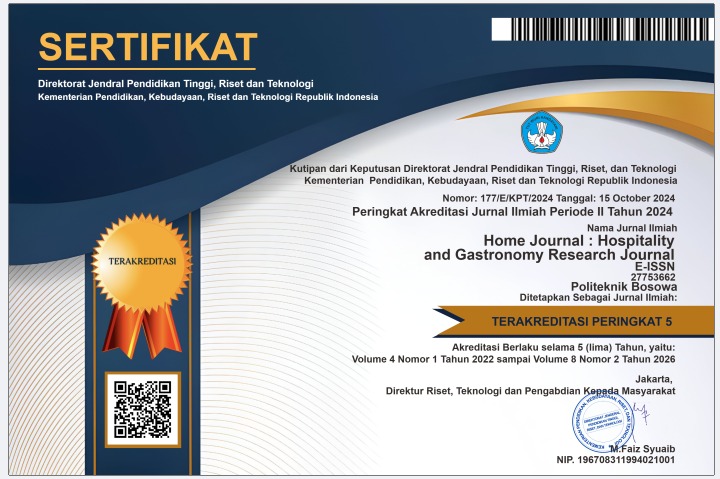PERANAN PROGRAM LOYALITAS ALL ACCOR LIMITLESS TERHADAP KUALITAS PELAYANAN (STUDI KASUS PADA HOTEL IBIS STYLES MEDAN)
Abstract
The purpose of this study is to see how loyalty programs affect service quality at the Ibis Styles Medan. This is a qualitative study that use the case study method. Primary data and secondary data are the two categories of data used in this study. The findings of interviews with the front desk agent at the Ibis Styles Hotel Medan provided primary data, while secondary data was collected from the All Accor website. Based on the findings of the study, the following conclusions were made: 1) Provide benefits and advantages of loyalty programs that have an impact on hotel satisfaction and service quality. This is demonstrated through consumer reviews on the official All Accor website, which is used in conjunction with Trust You to calculate hotel ratings. 2) The convenience gained from the adoption of the loyalty program has an impact on increasing service quality. This is highlighted by the ease with which members of the loyalty program easily book rooms through the all accor website by inputting an e-mail address, and the front office department immediately collect guest data from room bookings which are already automatically registered in the fols system.
Full Text:
PDF (Bahasa Indonesia)References
Accor, A. (n.d.). All Accor Live Limitless. https://all.accor.com/loyalty- program/reasonstojoin/index.id.shtml
Amaro, S., & Duarte, P. (2013). Online travel purchasing: A literature review. Journal of Travel and Tourism Marketing, 30(8), 755–785. https://doi.org/10.1080/10548408.2013.835227
Arikunto, S. (2010). Prosedur Penelitian: Suatu Pendekatan Praktik, Edisi Revisi. Rineka Cipta. Buhalis, D., & Law, R. (2008). Progress in information technology and tourism management: 20 years on and 10 years after the Internet-The state of eTourism research. Tourism
Management, 29(4), 609–623. https://doi.org/10.1016/j.tourman.2008.01.005
Creswell, J. W. (2010). Research Design: pendekatan kualitatif, kuantitatif dan Mixed. PT Pustaka Pelajar.
Group, A. (n.d.). Accor. https://group.accor.com/en
Hung, Y. C., Yang, Y. L., Yang, H. E., & Chuang, Y. H. (2011). Factors affecting the adoption of e-commerce for the tourism industry in Taiwan. Asia Pacific Journal of Tourism Research, 16(1), 105–119. https://doi.org/10.1080/10941665.2011.539394
Inversini, A., & Masiero, L. (2014). Selling rooms online: The use of social media and online travel agents. International Journal of Contemporary Hospitality Management, 26(2), 272– 292. https://doi.org/10.1108/IJCHM-03-2013-0140
Kotler, P., & Keller, K. L. (2005). Manajemen Pemasaran (12th ed.). PT. Indeks Kelompok Gramedia.
Purnama, N. (2006). Manajemen Kualitas Perspektif Global. Ekonesia.
Sugiyono. (2016). Metode Penelitian Pendidikan (Pendekatan Kuantitatif, Kualitatif dan R&D).
Alfabeta.
Thakran, K., & Verma, R. (2013). The emergence of hybrid online distribution channels in travel, tourism and hospitality. Cornell Hospitality Quarterly.
Yulianti, Y. D., Nurcahyo, R., & Dachyar, M. (2019). Strategi Penentuan Harga dan Penjualan Hotel Pada Online Travel Agency ( OTA ). Seminar Dan Konferensi Nasional IDEC, 1, 2–3.
DOI: https://doi.org/10.61141/home.v6i1.412
Refbacks
- There are currently no refbacks.

This work is licensed under a Creative Commons Attribution-NonCommercial-ShareAlike 4.0 International License.










